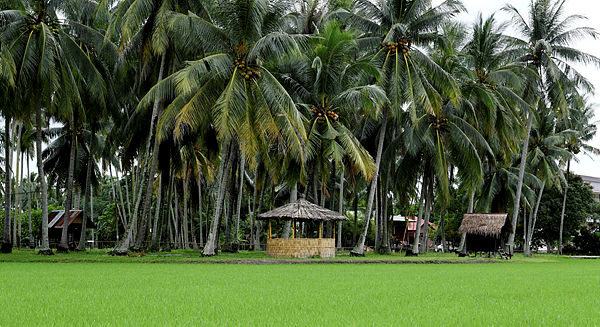KEPALA BATAS: Surrounded by a bamboo fence, hundreds of coconut trees, traditional homes and a kampong atmosphere, Kampung Agong located in Penaga here evokes the nostalgia of village life of a Malay community.
Spanning a 15-hectare area, Kampung Agong is a popular spot among local and foreign tourists who enjoy taking photos of its panoramic view and experience the traditional village setting, despite it being in operations for a mere six months.
According to its owner Ang Ee Zhan, 17, ‘Agong’ was the nickname given by the village folks to his grandfather, Ang Peng Tiam, 84, who owned a large plot of land, a coconut farm and a paddy field.
“This has been my grandfather’s coconut farm since 1942. As a child, I used to follow him to pluck coconuts, which along with padi, would be sold to the wholesalers. We had been toying with the idea of running a guest house here because the surrounding areas and the atmosphere are just out of this world.
“We built a guest house here in June last year for a RM100 per night rental. At the moment, Kampung Agong is not open to the public, it is only for paying guests who want to stay here,“ he told Bernama when met in Kampung Agong.
However, Ang said, the guest house had to be closed after the area was opened to the public as tenants had no privacy when Kampung Agong became popular. Visitors began to arrive in droves when Kampung Agong went viral on the social media.
This prompted Ang and his father, Ang Teow Chua, 48, to upgrade and improve the amenities and develop suitable attractions in Kampung Agong.
He said now visitors can not only take pictures of the place but also participate in various village activities such as cycling, coconut picking, fishing, playing congkak (a traditional game), learning how to weave coconut leaves into coconut brooms, and renting traditional attire to soak in the atmosphere.
“In Kampung Agong, we have about 500 coconut trees. Depending on the season, visitors can pick any fruits in the village such as ‘bachang’ (a type of mango), cempedak (jackfruit), guava, ‘pisang durian’ (a variety of banana) and kaffir limes. There are also a number of birds’ nests here.
Ang said extensive refurbishment projects are currently ongoing in the area for the benefit of the visitors including building nine accommodation units to meet the demand of overnight visitors and are expected to be ready by early next year in conjunction with Visit Malaysia Year 2020.
“We want to promote ecotourism here. In the long run, we plan to buy boats and bring visitors from Batu Ferringhi here and show them a mangrove swamp. Then, they can take a boat ride to the Sungai Penaga jetty and have the opportunity to see the lives of village folks such as fishermen, take them to Pasar Bisik (Whispering Market) and more.
“We want the village folks to be involved too, not just to promote Kampung Agong. In the near future, we will also give villagers a chance to sell food and drinks. This is only for the village folks, not for outsiders so that the village community can earn money (through) ecotourism, “he said.
Kampung Agong is open daily from 9am to 6pm with a fee charged for RM3 for children aged four to 11, RM5 for children aged 12 and adults, and RM10 for foreign visitors. Admission is free for infants under three years old. — Bernama









